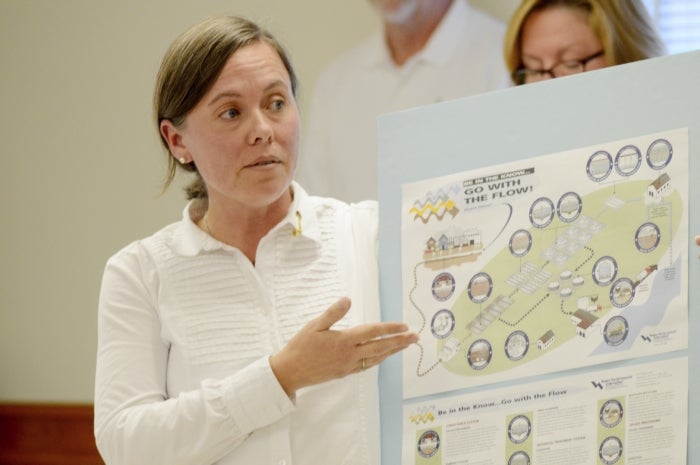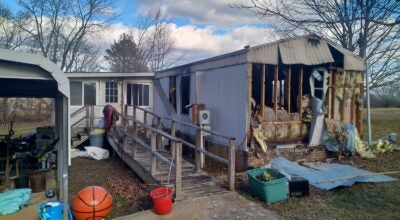Charlotte puts sludge expansion into Rowan on pause
Published 12:15 am Thursday, February 5, 2015

- Josh Bergeron / Salisbury Post - Maggie Macomber, who works for Charlotte-Mecklenburg Utilities, in late 2014 describes the process that wastewater goes through before being spread as sludge on farm fields.
Charlotte-Mecklenburg Utilities on Tuesday temporarily withdrew its permit to expand its biosolid application program into Rowan County.
CMUD, recently renamed Charlotte Water, on Tuesday notified North Carolina’s Department of Environment and Natural Resources that the city wished to withdraw its permit for expansion, according to Jean Creech, who oversees the city’s biosolid application program. The expansion would include a few dozen tracts of land in five counties. The expansion contains 10 tracts of land in Rowan and several near the border in Iredell and Cabarrus counties.
Creech said the reasoning for the withdrawal was several violations issued by DENR to Gold Hill farmer Phil Cline.
“We’ve withdrawn our request for modification for all of the potential new land sites,” Creech said. “It’s easier to pull everything away, see what the outcome is and then we can go forward.”
In its application to DENR, Charlotte looked to not only expand the reach of its biosolid program, but also renew all of its current sites for land application. Charlotte’s program processes sewer water into a sludge-like material that’s spread on farm fields in North and South Carolina as a cheaper alternative to traditional fertilizer. Charlotte pays a company called Synagro to haul off its sludge. Synagro then spreads sludge on farm fields at no cost to farmers.
Cline was listed on the expansion to receive sludge on more than a dozen different fields, most of which are located in northern Cabarrus County.
In December, three divisions of DENR cited Cline, Hammill Construction and Carolina Stalite for multiple environmental violations, including operating a non-permitted waste site. The citations were issued in December. Violations were reported by residents of the Gold Hill area who were opposed to Cline’s application for sludge.
Letters from DENR stated that 750 feet of an unnamed tributary leading into Little Buffalo Creek was filled with the emission control dust — a waste product from Carolina Stalite’s operations. As a result, letters stated, the pH level changed for water located downstream. Michael Parker, DENR’s regional supervisor for water quality, wrote in one letter that 22 feet of the waste had built up on the bottom of the unnamed tributary. The built-up waste resulted in the “loss of the channel for aquatic wildlife,” stated Parker’s letter.
Both Carolina Stalite and Cline claim the emission control dust was equivalent to lime, which is commonly used on farm fields to balance pH levels.
Along with the waste from Carolina Stalite, DENR also found “plastic wrap, plywood, dimensional cut lumber, large industrial poly bulk bags and a crushed metal barrel on the northeastern slope of the disposal site,” a letter stated.
Representatives from the U.S. Army Corps of Engineers have also visited Cline’s non-permitted dump site.
Crystal Amschler, who works in the corp’s Asheville office, said she couldn’t talk about specifics of Cline’s property, but confirmed she visited the field, near Gold Hill, last week.
“Ultimately, if there is fill material we get involved regardless of what the Division of Water Resources is doing,” Amschler said.
Fill material is commonly used in construction or to build up shoulders during highway projects. Carolina Stalite produces lightweight aggregate, used in construction, which resulted in the emission control dust.
Amschler said in cases like Cline’s there’s typically two options, restoring a stream to its original state or obtaining a permit. She said restoration is a more likely option in Cline’s case. Letters from DENR also required Cline to restore the polluted stream to its original state.
Contact reporter Josh Bergeron at 704-797-4246


